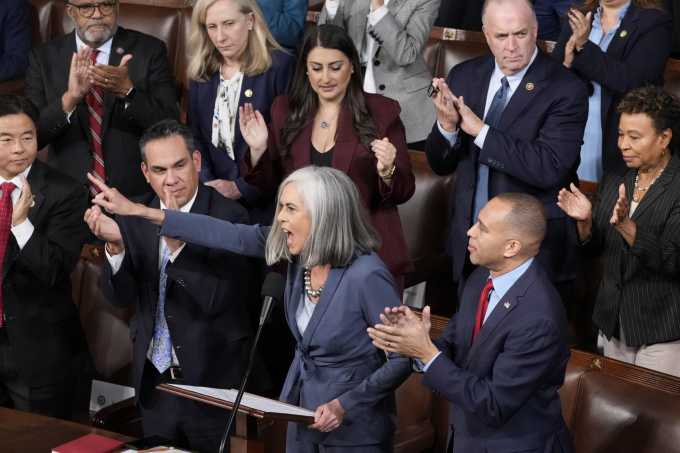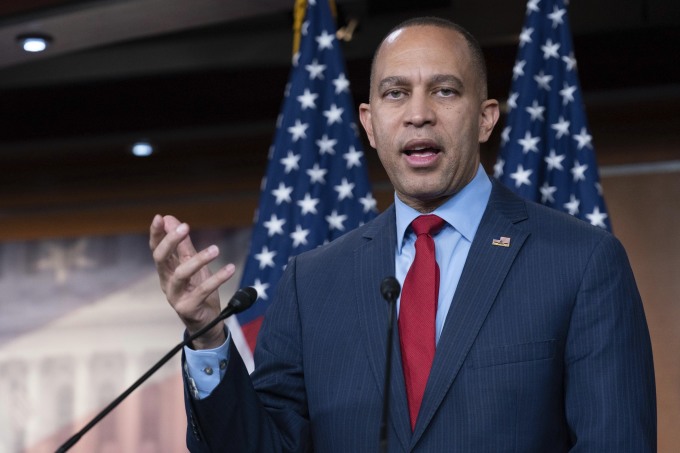For the past three weeks, Republicans have been unable to find a candidate who can gain enough votes to fill the position of Speaker of the House of Representatives, paralyzing the US legislature.
The crisis in the US House of Representatives began on October 3, when Mr. Kevin McCarthy lost his position as Speaker according to a resolution submitted and passed by Republican congressman Matt Gaetz. This was the first time in the history of the US House of Representatives that supported a resolution to remove the speaker of this agency.
The Speaker of the House is the third most powerful position in the US government , after the president and vice president. The seat usually belongs to the majority party in the House, although it is not a requirement. With control of the House, Republicans will not want the position to go to an independent or a Democrat.
However, Republican lawmakers have not been able to unite support for their party's candidate, leaving the US House of Representatives in a state of "headless snake" and functional paralysis for the past three weeks, while Washington faces a series of urgent issues such as aid to Ukraine, the Israel-Hamas conflict and the approaching government shutdown deadline.
"The shortest distance between two points is a straight line through them, but in their effort to elect the Speaker of the House, Republicans have chosen a much more circuitous and difficult path," Fox News writer Chad Pergram commented on October 22.
According to Mr. Pergram, the nature of the election of the Speaker of the House is just a simple "math", because the Republicans are in the majority with 221 seats in the House of Representatives, the Democrats hold 212 seats. Their candidate only needs more than half of the votes of the participating senators to be elected Speaker of the House.
But after countless closed-door meetings and ballots over the past three weeks, the Republican candidates fell short of the 217 votes needed to become the new speaker. Republicans were unable to find common ground to reach this typically procedural decision.
“The one thing that House Republicans have had in common over the past few weeks is that no matter what plan they put out, they will change it 180 degrees within hours,” Pergram said.

House Republican Leader Steve Scalise (left) and House Judiciary Committee Chairman Jim Jordan. Photo: AP
After McCarthy was removed from office, Patrick McHenry was appointed acting speaker, with very limited powers. According to House guidelines and procedures, the acting speaker "may exercise the powers of the speaker as necessary and appropriate pending the election of a new leader."
House Majority Leader Steve Scalise was nominated by the Republican Party on October 11, defeating his opponent, House Judiciary Committee Chairman Jim Jordan. However, in a closed-door meeting on October 12, the Republicans were unable to unite support for Scalise, meaning he would lose if the House voted on him. Scalise announced his withdrawal, 30 hours after being nominated.
On the afternoon of October 13, the Republican Party selected Mr. Jordan as its candidate after a closed meeting. However, he failed in two consecutive votes in the House of Representatives on October 17 and 18. Notably, the number of votes supporting Jordan gradually decreased, from 200 in the first round to 199 in the second round.
Some Republicans have been outraged by what they call "heavy-handed tactics" by Jordan and his allies, with relatives of some lawmakers who did not vote for him being harassed or receiving threatening messages. Congresswoman Mariannette Miller-Meeks reported the threat to the US Capitol Police, describing Jordan as a "bully".
Congressman Drew Ferguson had planned to vote for Jordan in the runoff, but changed his mind because of the "intimidation tactics." He also called Jordan a "bully."
Jordan's allies were quick to defuse the situation. "Jordan has never pressured anyone," said Congressman Ralph Norman. Congressman Scott Perry said that "members of Congress have received threats before and this is not something to be concerned about."

House Democratic Deputy Leader Katherine Clark (center) criticizes Jim Jordan as lawmakers vote in the third round of the House Speaker election on October 20. Photo: AP
Meanwhile, the Democratic Party showed unity, with all 212 lawmakers voting for House leader Hakeem Jeffries. Mr. Jeffries also did not name any Republican candidate who could receive concessions from the Democrats to gain enough votes to become Speaker of the House.
The House of Representatives is scheduled to vote for a third time at around 1 p.m. on October 19. However, the Republicans convened an internal meeting at 11 a.m. the same day. Before the meeting, Jordan indicated that he was still the Republican Party's main candidate, but also supported the plan to give acting Speaker McHenry more power to ensure that the House can perform its basic function of passing bills without electing an official Speaker.
Four hours later, Republicans adjourned, deciding to drop the idea of giving McHenry more power. The House plans to postpone the vote until the evening of October 19, possibly while President Joe Biden addresses the nation about the Hamas-Israel war.
The House of Representatives convened on the evening of October 19 but did not hold a vote, instead postponing it to 11am on October 20. As a result, Mr. Jordan continued to fail in the third round, with only 194 votes in favor. Mr. Jeffries still received the full 210 votes of the participating Democratic congressmen.
"House Democrats have made it clear repeatedly that we want a bipartisan path to leadership, but Republicans have rejected it and chosen extremism," Jeffries told reporters on October 20.
Amid the chaos of the Republican Party's efforts to find a new House Speaker, Mr. Jeffries' announcement is expected to help Democrats regain control of the House in the 2024 election.

House Democratic Leader Hakeem Jeffries speaks in Washington on October 20. Photo: AP
Senator Warren Davidson, an ally of Mr. Jordan, proposed on October 19 that the House vote be held on a weekend. This move could benefit Mr. Jordan, as some members with personal schedules would not be able to participate in the vote in the House, helping to reduce the majority of votes.
With a certain number of absentees, according to the right party line, Mr. Jordan could win. But it is also a gamble for the Republicans, because with the right line, Jeffries could win and they would lose the Speakership to the Democrats.
But that scenario did not happen. The Republicans met in private on the afternoon of October 20 and decided to withdraw Mr. Jordan’s candidacy. They had until October 22 to announce a new candidate. Immediately after that, nine congressmen announced their candidacy for the Speakership: Jack Bergman, Byron Donalds, Tom Emmer, Kevin Hern, Mike Johnson, Dan Meuser, Gary Palmer, Austin Scott and Pete Sessions.
The Republican Party is scheduled to discuss candidates at 6:30 p.m. on October 23 (5:30 a.m. on October 24, Hanoi time), then hold internal votes to choose a representative at 9 a.m. on October 24 (20:00 p.m. Hanoi time). Acting House Speaker McHenry said he plans to hold a vote to elect a new leader "as early as October 24."

9 Republican congressmen running for speaker of the House. Photo: X/@MSNBC
“This is one of the most embarrassing things I’ve ever seen,” House Foreign Affairs Committee Chairman Michael McCaul said on October 22, adding that he is in his 10th term. Asked about a deal with Democrats, McCaul said it was under consideration, but some lawmakers said it was also dangerous.
McCarthy said on October 22 that Jordan and Scalise could both do well as House Speaker. Of the nine candidates, McCarthy supported Emmer, who is currently the House deputy majority leader, the third most powerful position in the chamber.
Asked if he would run for speaker, McCarthy said he “doesn’t need that position,” adding that he is still a member of Congress and will be at the forefront of efforts to protect America. McCarthy had to win 15 votes and make several compromises with the far-right wing of the Republican Party in January to gain enough support to become speaker.
"I hope people can come together, put country above politics and solve this problem," he said.
Nhu Tam (According to Fox News, The Hill, NBC News )
Source link





































































































Comment (0)